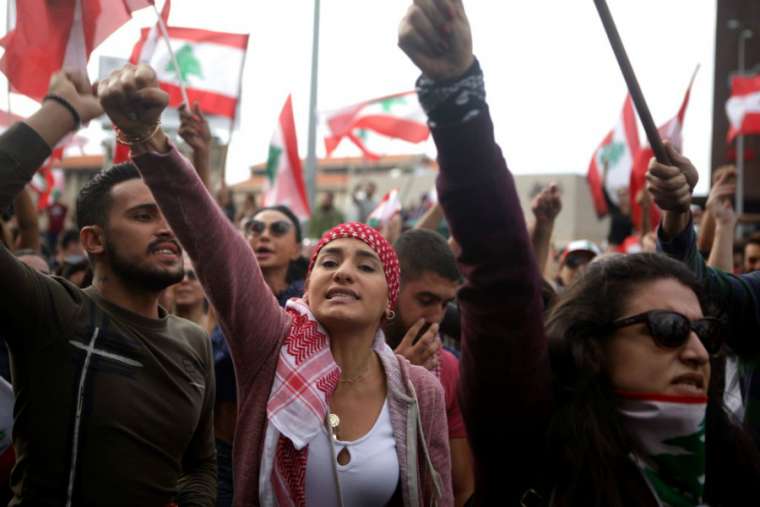
- ARAB NEWS
- 11 Jul 2025

Three weeks on, and Lebanon’s demonstrations show no sign of abating. Prime Minister Saad Hariri has tendered his resignation and reform bills have been presented, yet more Lebanese continue to take to the streets.
This week, students are leaving their schools and universities to join and women are a noticeable presence. Formations change, songs come and go, but one line remains firm. “All of them means all of them,” the blunt slogan “kellun yaani kellun” is turning out to be a much more serious demand in the sectarian state system than the wildest political guesses might have risked a few months ago.
Lebanon’s multiple postwar political alliances, along with the names under which they operate, have constantly crossed conventional religious and ideological lines. Groupings worked at times under traditional political labels, and at others they followed confessional categories.
But parties and alliances have also been labeled with numbers that referred to the dates of particularly divisive events, such as the assassination of former Prime Minister Rafik Hariri or the mass protests ignited in its aftermath. While subnational labels shifted, song seemed to forge its own political sphere — one that rarely obeyed strategic fault lines.
The political songs of Julia Boutros, the Christian singer who has family roots in Southern Lebanon, are a helpful example. While Boutros’ was not the only voice to be coined with patriotic song in Lebanon, she has been significant in forming a nationalistic sentiment that was based on the shared value of territorial integrity, individual and collective dignity, power and resistance.
Her appeal, which emerged with her appearance as a talented child singer in the 1970s and 1980s, was contemporaneous with a uniquely common goal in the divisive years of the Lebanese war: Resisting the Israeli military presence, and aggression, in Southern Lebanon.
Yet even that semblance of a unified political purpose was not consistent, nor was it complete. Between the aftermath of the 1982 invasion, in which Israeli forces reached Beirut, and the subsequent creation of a security zone, where military control was shared between the Israeli army and its Lebanese allies (the South Lebanon Army), the desire to regain control over all Lebanese territory was hardly regional.
Until the sudden withdrawal of Israeli forces in May 2000, Southern Lebanon remained a tender point in the national body. One singer whose output kept focus on the matter over the decades was Boutros. Her songs became emblematic of resistance against the foreign military presence, as well as all forms of intimidation, even when one faction’s aggressors were another’s allies.
“The sun of truth has been eclipsed; dawn became sunset,” opens Boutros’ 1985 song “Ghabet Shams El Haq.” “We refuse to die. Tell them we will stay. Your land, and homes. The hard-working people. Hear. Oh south. My beloved south,” goes the refrain. Written on the heels of the Israeli invasion and in the midst of a bloody war, this song reliably roused masses for decades.
As late as the 2010s, audiences of thousands sent the loudest cheers within two seconds of the opening musical line, singing along with precision. Although the Israeli presence in Southern Lebanon eventually ceased in 2000 (in all but a small strip of land that continues to be contested by multiple sides), the power of Boutros’ song had not waned.
Similarly to almost every other local political loyalty, Boutros’ allegiance to a coalition of theocratic and socialist ideologies was a complicated one. The multiple layers of her fan base’s political commitment to Hezbollah and its leftist supporters were only compounded by the national alliance Hezbollah subsequently forged with Michel Aoun — to the dismay of members of the Christian former army general’s ultranationalist supporters at the right end of the political spectrum. Still, Boutros’ songs continued to bring large audiences to their feet, at least until a year or two ago.
The last three weeks, however, have successfully blurred not only the fine gradations of the politico-confessional spectrum and its variations of the last four decades, but also the large brushstrokes that united people across its lines, few and far between as those brushstrokes have been.
Today, a new fault line in power alignments is unfolding in the Lebanese public square. Shocking the system and its maintainers alike, the binary split cuts across seemingly unmovable blocks. Like never before, the new “us” and “them” arrangement is as simple as it is clear. In a political environment where neither simplicity nor clarity seemed conceivable, the people of Lebanon have made up their mind: It is “us” the people against “them” the politicians. New to office or old powerbrokers, “all means all” remains the street’s unwavering demand for the political elite’s departure.
In three words, each chanted to one beat and followed by a silent fourth, the rhythmic Arabic slogan encapsulates a singularity that hardly anyone thought possible. Still, like many norm-challenging ideas, in its simplicity this uncompromising demand belies much difficulty.
Tala Jarjour is author of “Sense and Sadness: Syriac Chant in Aleppo” (OUP, 2018). She is currently Visiting Research Fellow at King’s College London and Associate Fellow of Pierson College at Yale.